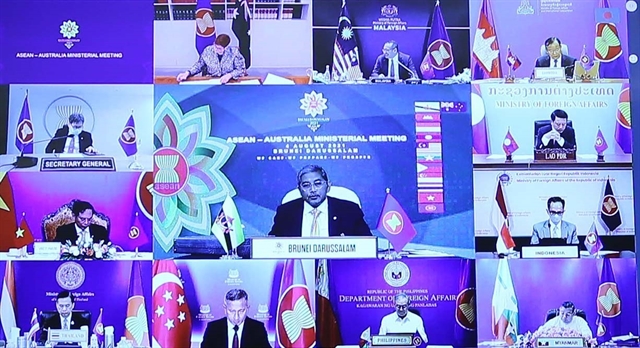 Politics & Law
Politics & Law

The ASEAN-Australia Post Ministerial Conference was held on Tuesday, with the attendance of Australian Minister for Foreign Affairs Marise Payne along with her counterparts from all 10 Southeast Asian countries, with COVID-19 cooperation and regional issues topping the agenda.

|
| ASEAN-Australia Foreign Ministers Meeting held virtually on Wednesday. — VNA/VNS Photo Phạm Kiên |
HÀ NỘI — The ASEAN - Australia Post Ministerial Conference was held on Wednesday. In attendance was Australian Minister for Foreign Affairs Marise Payne along with her counterparts from all 10 Southeast Asian countries, with COVID-19 cooperation and regional issues topping the agenda.
Payne stressed Australia has always cherished its ties with ASEAN and that ASEAN-led dialogues and cooperation mechanisms are effective.
The Australian diplomat announced that the country is delivering vital COVID-19 support through supplying vaccines as well as an AU$300 million commitment under the country’s Vaccine Access and Health Security Initiative, which includes an AU$21 million contribution to the ASEAN Centre for Public Health Emergencies and Emerging Diseases.
Australia is also providing AU$100 million through the Quad Vaccine Partnership, according to Payne.
On behalf of ASEAN, as the current relationship coordinator, Malaysian foreign minister Datuk Seri Hishammuddin Tun Hussein said ASEAN values the positive progress in the ASEAN-Australia partnership and that Australia continues to be one of ASEAN's most important economic partners with total trade reaching upwards of AU$100 billion.
ASEAN countries expressed their wish to cooperate with Australia in promoting research, development, production and supply of COVID-19 vaccines in an equitable and effective manner.
The two sides agreed to continue promoting cooperation in priority areas such as economic-trade-investment, ensuring supply chain connectivity and the flow of essential goods, and utilising the effectiveness of the Agreement Establishing the ASEAN-Australia-New Zealand Free Trade Area (AANZFTA), as well as soon ratifying the Regional Comprehensive Economic Partnership (RCEP).
ASEAN and Australia also pledged to boost cooperation in developing the creative economy, the digital economy, along with the development of digital infrastructure to help drive recovery and growth.
ASEAN countries asked Australia to continue providing support in priority areas such as combating terrorism and transnational crime, education, environmental protection, climate change and disaster management, and further cooperating in sub-regional development and narrowing the development gap.
The two sides affirmed that they will continue to work closely together to contribute to maintaining peace and stability in the region, including security and stability in the South China Sea, one of the world’s most critical maritime routes, but fraught with instability, and facing complicated and worrying developments.
The Australian diplomat reiterated Australia's support for ASEAN's principled stance regarding the waterway and its role in promoting dialogue and enhancing confidence-building to ensure the full and effective implementation of the Declaration of Conduct in the sea, and to build an effective Code of Conduct in accordance with international law and UNCLOS 1982.
Australia said it remains committed to supporting ASEAN’s role in Myanmar and continued to urge the full and timely implementation of ASEAN’s Five-Point Consensus, including the immediate appointment of a special envoy to Myanmar, the minister added.
The Vietnamese foreign minister Bùi Thanh Sơn welcomed the new development chapter in the ASEAN-Australia Strategic Partnership.
The minister proposed Australia continue to support ASEAN countries in a timely and effective COVID-19 response. He also emphasised that ASEAN and Australia needed to take steps to maintain market openness, stabilise supply chain linkages, and make effective use of existing trade agreements in the region.
He also encouraged Australia to actively participate in efforts to narrow the development gap and ensure inclusive growth in sub-regions, including the Mekong.
Sharing the opinions of other ASEAN members with regards to the South China Sea issue, the Vietnamese diplomat asked Australia to cooperate in promoting dialogue and building trust, and exercising restraint and respect for international law, including the 1982 UNCLOS. — VNS




